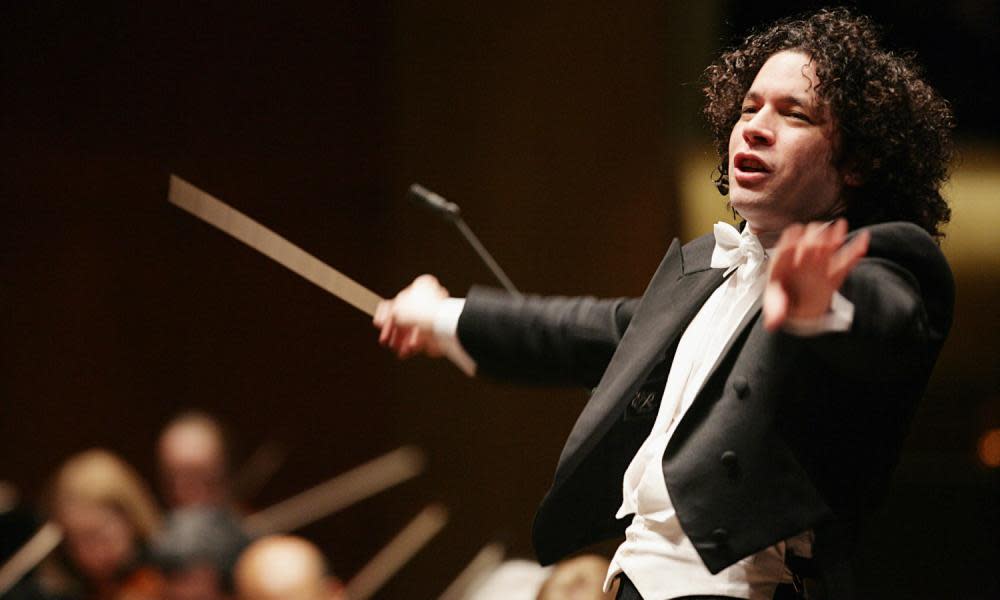The whole world must join the battle for Venezuela’s El Sistema | Marshall Marcus

In the music business, the occasional tour cancellation is almost a way of life. Lack of money, indisposed artists, terror attacks, ash clouds and much more can easily cause the best laid plans to crumble. But on Monday came something exceptional as the media reported that Venezuela’s most celebrated orchestra, the Orquesta Sinfónica Simón Bolívar de Venezuela, had had its forthcoming US tour cancelled by the office of the president of Venezuela.
Headlines across the world mentioned the name Dudamel, referring to the orchestra’s star conductor, the charismatic 36-year-old Gustavo Dudamel. Perhaps this should be no surprise: Dudamel had previously refused to comment on Venezuela’s political situation but did, with measured but increasing criticism, eventually come out against the growing violence. Last Friday the Venezuelan president, Nicolás Maduro, snapped back. “Welcome to politics, Gustavo Dudamel,” he is reported to have said. “But act with ethics, and don’t let yourself be deceived into attacking the architects of this beautiful movement of young boys and girls.”
He was referring to El Sistema, Venezuela’s most famous educational and cultural initiative. The musical education programme seeks to empower underprivileged children by teaching them music. Founded in 1975, it has received international acclaim, and has centres around the world, in countries including the US, the UK, Canada and Portugal.
Of course, the media loves this kind of thing – a super-successful young maestro getting into a fight off the podium provokes that old debate about whether the arts should wade in or stay out of politics. But that is not what this story is really about. Listen carefully to Maduro’s words, and this sounds like an attempt to take ownership of the narrative about El Sistema.
But Maduro will find that Dudamel will not be so easy to dislodge from the Sistema family, given his deep involvement in the programme since his childhood, in the early 1980s. The president, on the other hand, alighted on El Sistema only recently, when it became politically expedient for him to do so, after his election in 2013.
To lose El Sistema would be to lose one of the most precious commodities Venezuela has ever produced
In the coming battle for El Sistema, Venezuela’s government looks as though it holds all the cards – not least the purse strings to the programme – and has an increasingly authoritarian approach to solving any problems. But in attempting to take over a social action music programme that has been going for 42 years, Venezuela’s troubled leader may find that he has bitten off more than he can chew. There are millions of people in Venezuela who have been through, and are going through, El Sistema. It has is critics and opponents, but Maduro will have trouble trying to barge his way into ownership of it. So long, that is, as people resist.
And here is the rub: there have been quite a few raised voices about what seems to be El Sistema’s silence on the question of the injustices of the current Venezuelan government. A news piece yesterday in what is probably the world’s most read online music site called for “musicians who believe in justice and human rights … to make their voices heard”. And now is indeed the time. To lose El Sistema would be to lose one of the most precious commodities Venezuela has ever produced.
The slogan of El Sistema is tocar y luchar – “to play and to struggle”. In the US, where Dudamel is music and artistic director of the LA Philharmonic Orchestra, the Take a Stand platform brings together a number of El Sistema-inspired partners. El Sistema has spread around the world and now has hundreds of imitation programmes, thousands of young musicians and millions of supporters and audience members in every continent of the globe. Now that Dudamel has put himself on the line, it is time for all of those people to voice their support.
No one should be deceived about the power of such voices. But as the situation in Venezuela continues to deteriorate, making life for ordinary citizens impossible, it is simply too late to think about whether music and politics should be kept apart. Dudamel may have wanted that, but events have now taken over. And for everyone around the world who cares about Dudamel, his Sistema or the opportunity for young people to develop through music-making, it is now time to “take a stand”.
• Marshall Marcus is CEO of the European Union Youth Orchestra

 Yahoo News
Yahoo News 
